新人教高中英语必修4-Unit4-Body-language-Learning-about-Language课件(23张ppt)
文档属性
| 名称 | 新人教高中英语必修4-Unit4-Body-language-Learning-about-Language课件(23张ppt) | 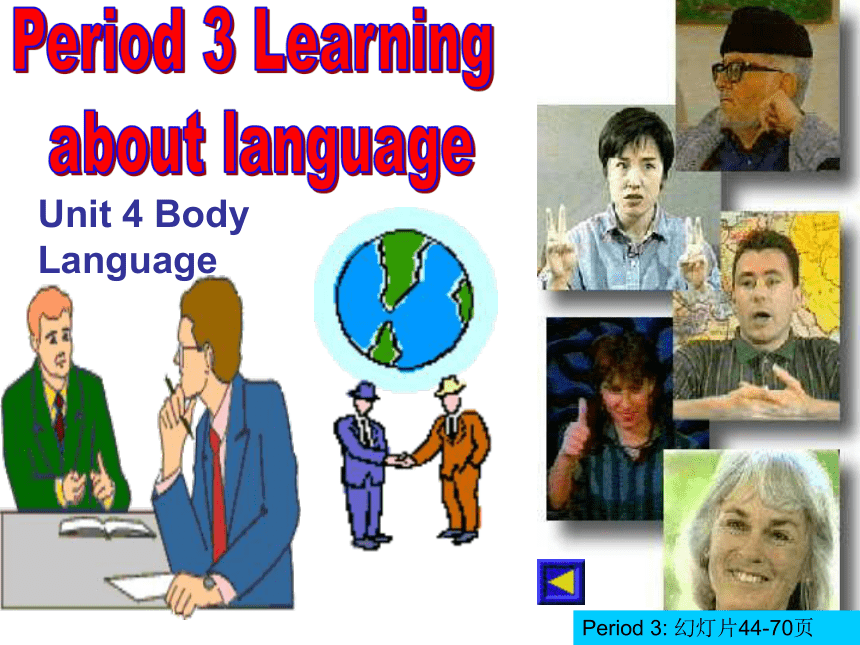 | |
| 格式 | zip | ||
| 文件大小 | 476.5KB | ||
| 资源类型 | 教案 | ||
| 版本资源 | 人教版(新课程标准) | ||
| 科目 | 英语 | ||
| 更新时间 | 2021-02-12 22:59:38 | ||
图片预览


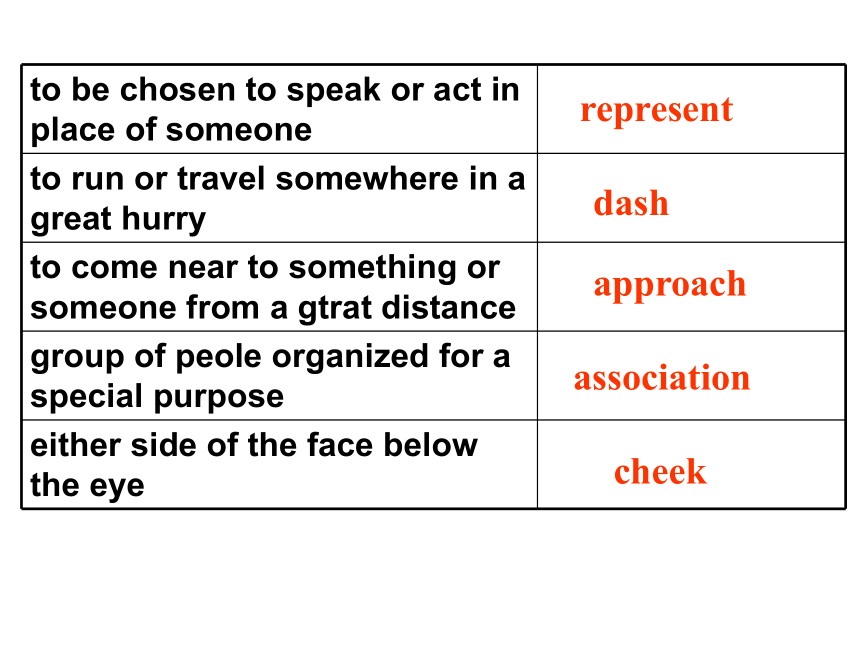

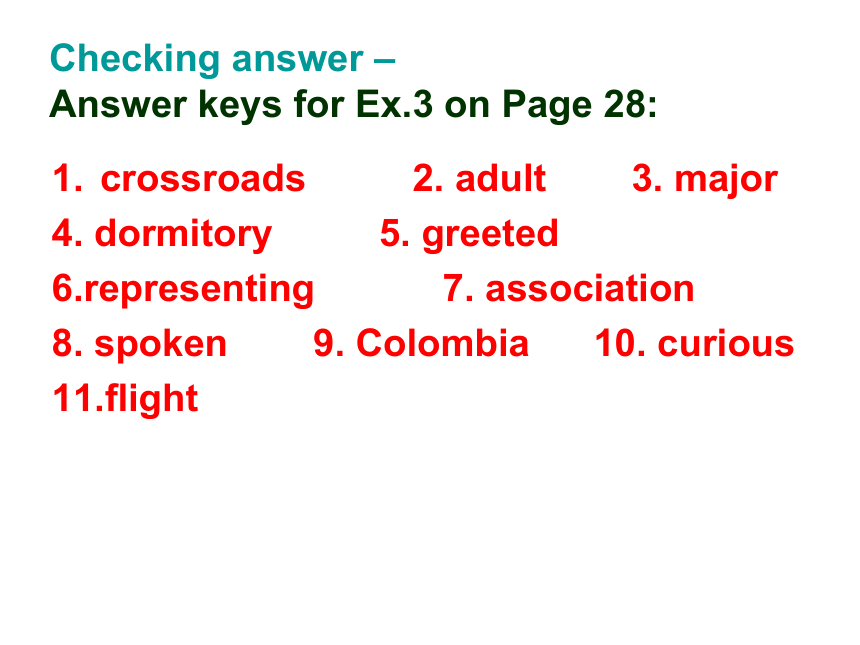
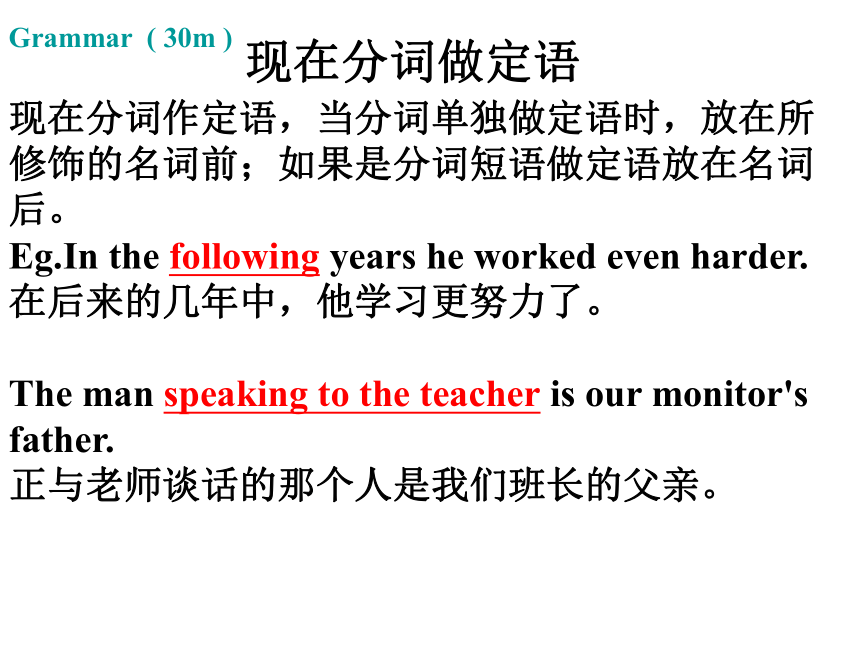
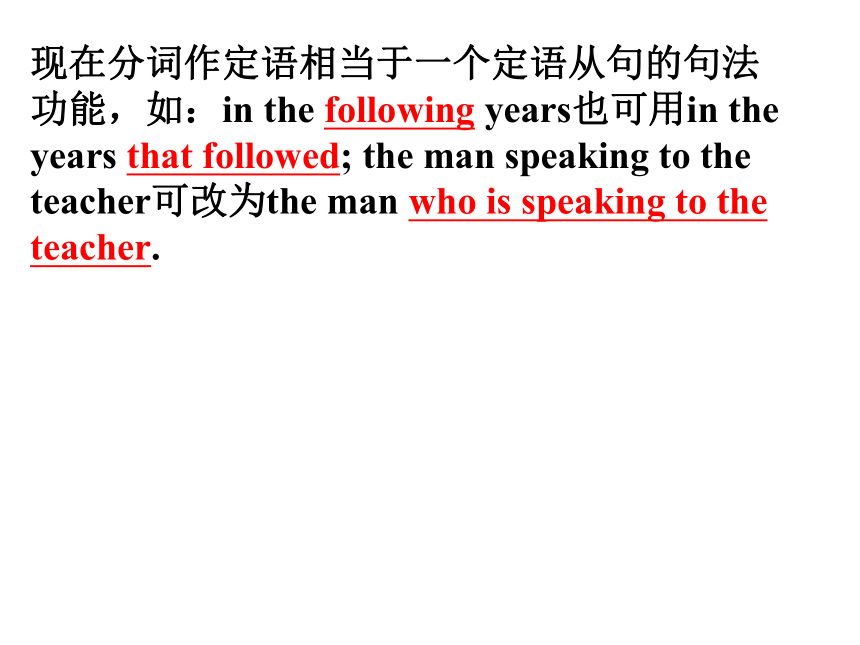
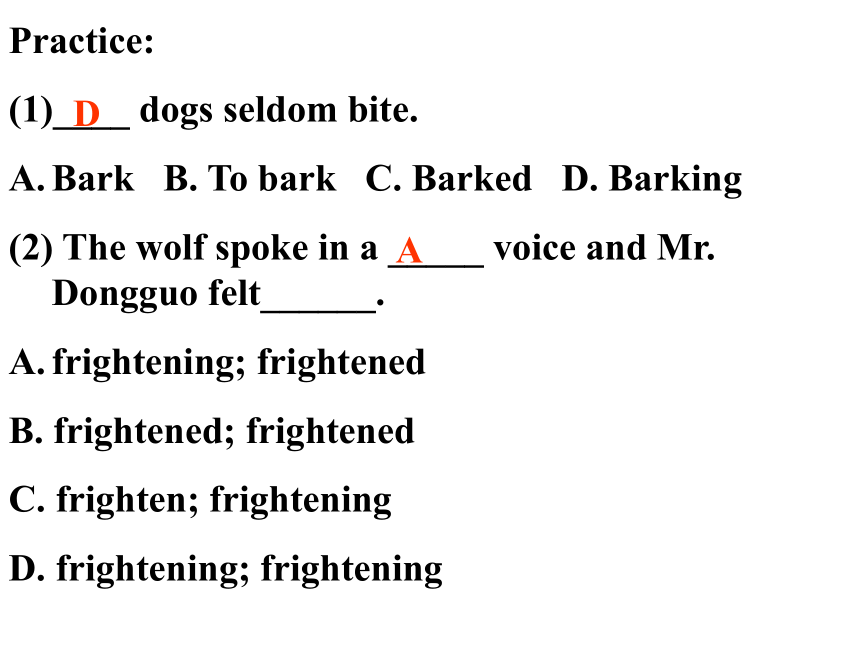
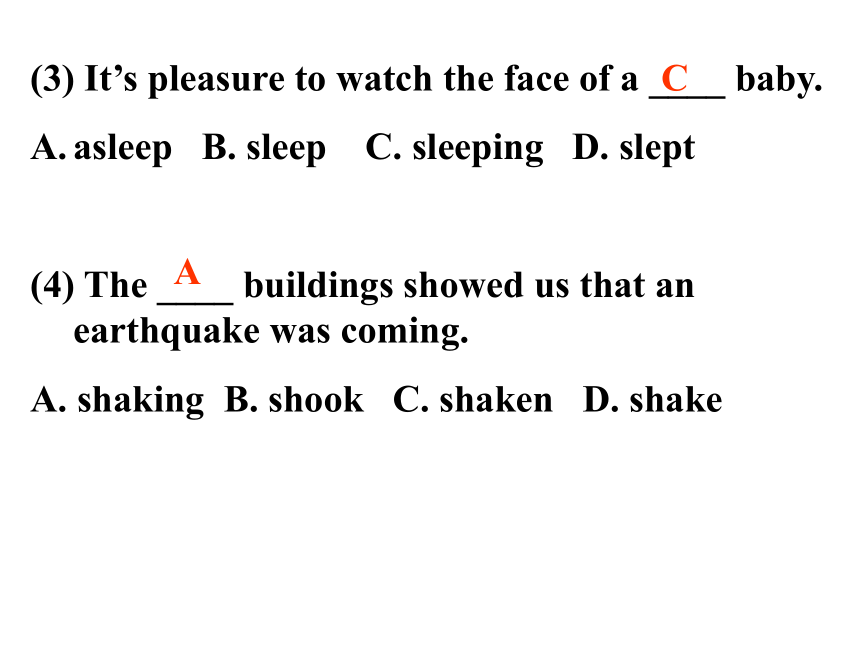
文档简介
(共23张PPT)
Unit
4
Body
Language
Period
3:
幻灯片44-70页
Checking
answer
–
Answer
keys
for
Ex.1
on
Page
27:
Alternative
expressions
Words
and
expressions
from
the
text
action
of
defending
oneself
against
an
enemy’s
attack
might
happen
or
probable
will
be
true
Euroean
country
that
is
shaped
like
a
boot
small
restaurant
provided
by
a
school
for
its
students
or
by
a
company
for
its
employees
defence
canteen
Italy
likely
to
be
chosen
to
speak
or
act
in
place
of
someone
to
run
or
travel
somewhere
in
a
great
hurry
to
come
near
to
something
or
someone
from
a
gtrat
distance
group
of
peole
organized
for
a
special
purpose
either
side
of
the
face
below
the
eye
cheek
association
approach
dash
represent
Checking
answer
–
Answer
keys
for
Ex.2
on
Page
28:
approached
Jordan
cheek
couriously
dashed
misunderstood
7.
conrary
Checking
answer
–
Answer
keys
for
Ex.3
on
Page
28:
crossroads
2.
adult
3.
major
4.
dormitory
5.
greeted
6.representing
7.
association
8.
spoken
9.
Colombia
10.
curious
11.flight
现在分词作定语,当分词单独做定语时,放在所修饰的名词前;如果是分词短语做定语放在名词后。
Eg.In
the
following
years
he
worked
even
harder.
在后来的几年中,他学习更努力了。
The
man
speaking
to
the
teacher
is
our
monitor's
father.
正与老师谈话的那个人是我们班长的父亲。
现在分词做定语
Grammar
(
30m
)
现在分词作定语相当于一个定语从句的句法功能,如:in
the
following
years也可用in
the
years
that
followed;
the
man
speaking
to
the
teacher可改为the
man
who
is
speaking
to
the
teacher.
Practice:
____
dogs
seldom
bite.
Bark
B.
To
bark
C.
Barked
D.
Barking
(2)
The
wolf
spoke
in
a
_____
voice
and
Mr.
Dongguo
felt______.
frightening;
frightened
B.
frightened;
frightened
C.
frighten;
frightening
D.
frightening;
frightening
D
A
(3)
It’s
pleasure
to
watch
the
face
of
a
____
baby.
asleep
B.
sleep
C.
sleeping
D.
slept
(4)
The
____
buildings
showed
us
that
an
earthquake
was
coming.
A.
shaking
B.
shook
C.
shaken
D.
shake
C
A
现在分词在语法功能上相当于动词、形容词和副词。现在分词通常和逻辑主语之间存在主动关系。但要注意它地各种形式变化:
主动形式
被动形式
V-ing
being
V-ed
having
V-ed
having
been
V-ed
现在分词做状语
一般式
完成式
Eg.
Hearing
the
bell,
the
students
began
to
enter
the
classroom.
听见铃声,学生们开始走进教室。(听见和进入两个动作同时发生)
The
building
being
built
now
is
our
new
library.
现在正在建造地
这栋楼房室我们地
新图书馆(being
built为现在分词的被动形式,表示动作正在进行之中。)
Having
done
the
work,
he
went
home.
完成了工作,他就回家了。
现在分词作状语
现在分词作状语往往和逻辑主语之间存在主动关系。现在分词作状语,常常用来表示原因、时间、方式、结果、条件、伴随状况等。现在分词一般不用作表目的地状语(通常用不定式表目的地状语)。
Walking
in
the
street,
I
came
across
an
old
friend
of
mine.
(=When
I
was
walking
in
the
street,
I
came
across
an
old
friend
of
mine.)
While
waiting
for
the
bus,
he
read
a
copy
of
China
Daily.
(=While
waiting
for
the
bus,he
read
a
copy
of
China
Daily.)
1)表时间状语
2)
表原因状语
Being
ill,
he
didn’t
go
to
school.
(=as
he
was
ill,
he
didn’t
go
to
school.)
Being
a
student,
you
should
study
hard.
(=Since
you
are
a
student,
you
should
study
hard.)
既然你是一个学生,你就应该努力学习。
由于想到它或许在家,所以我就给他打了电话。
Thinking
he
might
be
at
home,
I
called
him.
(As
I
thought
he
might
be
at
home,
I
called
him.)
3)表方式、伴随情况地状语
:作伴随状语地分词表示的动作,必须是主语的一个
动作,或是与谓语所表示地动作(或状态)同时发生,或是对谓语表示地动词(或状态)作进一步地补充说明。
Eg.
He
sat
on
the
sofa,
watching
TV.
(=He
sat
on
the
sofa,
and
watched
TV.)
他们笑着谈着走进了教室。
__________________
,
they
went
into
the
classroom.
他斜靠(lean)着墙站着。
He
stood
leaning
against
the
wall.(=He
stood
and
leaned
against
the
wall.)
Laughing
and
talking
4)
表结果
Eg.
Her
mother
died
in
1990,
leaving
her
with
her
younger
brother.
(=Her
mother
died
in
1990,
and
left
her
with
her
younger
brother.)
全国到处在传唱这首歌曲,使它成了一首最受欢迎地歌曲。
The
song
is
sung
all
over
the
country,__________________________________.
making
it
the
most
popular
song
5)表条件
Using
your
head,
you
will
find
a
way.
(=If
you
use
your
head,
you
will
find
a
way.)
一直往前走,你就会看到一座白色地房子。
______________,
you
will
see
a
white
house.
Walking
ahead
(6)与逻辑主语构成独立主格:
I
waiting
for
the
bus,
a
bird
fell
on
my
heard.
我等汽车时,一只鸟落到我头上。
All
the
tickets
having
been
sold
out,
they
went
away
disappointedly.
所有的票已经卖光了,他们失望地离开了。
Time
permitting,
we'll
do
another
two
exercises.
如果时间允许,我们将做另两个练习。
有时也可用with
(without)
+名词(代词宾格)+分词形式
With
the
lights
burning,
he
fell
asleep.
他点着灯睡着了。
(7)作独立成分:
Judging
from(by)
his
appearance,
he
must
be
an
actor.
从外表看,他一定是个演员。
Practise:
They
set
out
____
for
the
____
boy.
searching;
losing
B.
searching;
lost
C.
to
search;
lost
D.
searched;
losing
(2)
The
student
sat
there,
____
what
to
do.
doesn’t
knowing
B.
didn’t
knowing
C.
not
know
D.
not
knowing
B
D
(3)He
sat
there
_____
,
with
his
head
on
his
hand.
and
think
B.
thinking
C.
thought
D.
being
thought
(4)
The
____
Prime
Minister
expressed
his
satisfaction
with
his
talks,
___
that
he
had
enjoyed
his
stay
here.
visiting;
add
B.
visited;
adding
C.
visiting;
adding
D.
visited;
added
B
C
Homework:
Finish
the
the
ex.
3
and
the
exercise
in
Using
structures.
Unit
4
Body
Language
Period
3:
幻灯片44-70页
Checking
answer
–
Answer
keys
for
Ex.1
on
Page
27:
Alternative
expressions
Words
and
expressions
from
the
text
action
of
defending
oneself
against
an
enemy’s
attack
might
happen
or
probable
will
be
true
Euroean
country
that
is
shaped
like
a
boot
small
restaurant
provided
by
a
school
for
its
students
or
by
a
company
for
its
employees
defence
canteen
Italy
likely
to
be
chosen
to
speak
or
act
in
place
of
someone
to
run
or
travel
somewhere
in
a
great
hurry
to
come
near
to
something
or
someone
from
a
gtrat
distance
group
of
peole
organized
for
a
special
purpose
either
side
of
the
face
below
the
eye
cheek
association
approach
dash
represent
Checking
answer
–
Answer
keys
for
Ex.2
on
Page
28:
approached
Jordan
cheek
couriously
dashed
misunderstood
7.
conrary
Checking
answer
–
Answer
keys
for
Ex.3
on
Page
28:
crossroads
2.
adult
3.
major
4.
dormitory
5.
greeted
6.representing
7.
association
8.
spoken
9.
Colombia
10.
curious
11.flight
现在分词作定语,当分词单独做定语时,放在所修饰的名词前;如果是分词短语做定语放在名词后。
Eg.In
the
following
years
he
worked
even
harder.
在后来的几年中,他学习更努力了。
The
man
speaking
to
the
teacher
is
our
monitor's
father.
正与老师谈话的那个人是我们班长的父亲。
现在分词做定语
Grammar
(
30m
)
现在分词作定语相当于一个定语从句的句法功能,如:in
the
following
years也可用in
the
years
that
followed;
the
man
speaking
to
the
teacher可改为the
man
who
is
speaking
to
the
teacher.
Practice:
____
dogs
seldom
bite.
Bark
B.
To
bark
C.
Barked
D.
Barking
(2)
The
wolf
spoke
in
a
_____
voice
and
Mr.
Dongguo
felt______.
frightening;
frightened
B.
frightened;
frightened
C.
frighten;
frightening
D.
frightening;
frightening
D
A
(3)
It’s
pleasure
to
watch
the
face
of
a
____
baby.
asleep
B.
sleep
C.
sleeping
D.
slept
(4)
The
____
buildings
showed
us
that
an
earthquake
was
coming.
A.
shaking
B.
shook
C.
shaken
D.
shake
C
A
现在分词在语法功能上相当于动词、形容词和副词。现在分词通常和逻辑主语之间存在主动关系。但要注意它地各种形式变化:
主动形式
被动形式
V-ing
being
V-ed
having
V-ed
having
been
V-ed
现在分词做状语
一般式
完成式
Eg.
Hearing
the
bell,
the
students
began
to
enter
the
classroom.
听见铃声,学生们开始走进教室。(听见和进入两个动作同时发生)
The
building
being
built
now
is
our
new
library.
现在正在建造地
这栋楼房室我们地
新图书馆(being
built为现在分词的被动形式,表示动作正在进行之中。)
Having
done
the
work,
he
went
home.
完成了工作,他就回家了。
现在分词作状语
现在分词作状语往往和逻辑主语之间存在主动关系。现在分词作状语,常常用来表示原因、时间、方式、结果、条件、伴随状况等。现在分词一般不用作表目的地状语(通常用不定式表目的地状语)。
Walking
in
the
street,
I
came
across
an
old
friend
of
mine.
(=When
I
was
walking
in
the
street,
I
came
across
an
old
friend
of
mine.)
While
waiting
for
the
bus,
he
read
a
copy
of
China
Daily.
(=While
waiting
for
the
bus,he
read
a
copy
of
China
Daily.)
1)表时间状语
2)
表原因状语
Being
ill,
he
didn’t
go
to
school.
(=as
he
was
ill,
he
didn’t
go
to
school.)
Being
a
student,
you
should
study
hard.
(=Since
you
are
a
student,
you
should
study
hard.)
既然你是一个学生,你就应该努力学习。
由于想到它或许在家,所以我就给他打了电话。
Thinking
he
might
be
at
home,
I
called
him.
(As
I
thought
he
might
be
at
home,
I
called
him.)
3)表方式、伴随情况地状语
:作伴随状语地分词表示的动作,必须是主语的一个
动作,或是与谓语所表示地动作(或状态)同时发生,或是对谓语表示地动词(或状态)作进一步地补充说明。
Eg.
He
sat
on
the
sofa,
watching
TV.
(=He
sat
on
the
sofa,
and
watched
TV.)
他们笑着谈着走进了教室。
__________________
,
they
went
into
the
classroom.
他斜靠(lean)着墙站着。
He
stood
leaning
against
the
wall.(=He
stood
and
leaned
against
the
wall.)
Laughing
and
talking
4)
表结果
Eg.
Her
mother
died
in
1990,
leaving
her
with
her
younger
brother.
(=Her
mother
died
in
1990,
and
left
her
with
her
younger
brother.)
全国到处在传唱这首歌曲,使它成了一首最受欢迎地歌曲。
The
song
is
sung
all
over
the
country,__________________________________.
making
it
the
most
popular
song
5)表条件
Using
your
head,
you
will
find
a
way.
(=If
you
use
your
head,
you
will
find
a
way.)
一直往前走,你就会看到一座白色地房子。
______________,
you
will
see
a
white
house.
Walking
ahead
(6)与逻辑主语构成独立主格:
I
waiting
for
the
bus,
a
bird
fell
on
my
heard.
我等汽车时,一只鸟落到我头上。
All
the
tickets
having
been
sold
out,
they
went
away
disappointedly.
所有的票已经卖光了,他们失望地离开了。
Time
permitting,
we'll
do
another
two
exercises.
如果时间允许,我们将做另两个练习。
有时也可用with
(without)
+名词(代词宾格)+分词形式
With
the
lights
burning,
he
fell
asleep.
他点着灯睡着了。
(7)作独立成分:
Judging
from(by)
his
appearance,
he
must
be
an
actor.
从外表看,他一定是个演员。
Practise:
They
set
out
____
for
the
____
boy.
searching;
losing
B.
searching;
lost
C.
to
search;
lost
D.
searched;
losing
(2)
The
student
sat
there,
____
what
to
do.
doesn’t
knowing
B.
didn’t
knowing
C.
not
know
D.
not
knowing
B
D
(3)He
sat
there
_____
,
with
his
head
on
his
hand.
and
think
B.
thinking
C.
thought
D.
being
thought
(4)
The
____
Prime
Minister
expressed
his
satisfaction
with
his
talks,
___
that
he
had
enjoyed
his
stay
here.
visiting;
add
B.
visited;
adding
C.
visiting;
adding
D.
visited;
added
B
C
Homework:
Finish
the
the
ex.
3
and
the
exercise
in
Using
structures.
同课章节目录
